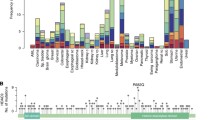Summary.
Imbalance in histone acetylation can lead to changes in chromatin structure and transcriptional dysregulation of genes that are involved in the control of proliferation, cell-cycle progression, differentiation and/or apoptosis. Histone acetyltransferases (HATs) and histone deacetylases (HDACs), are two classes of enzymes regulating histone acetylation and whose altered activity has been identified in several cancers. HATs and HDACs enzymes also target non histone protein substrates, including transcription factors, nuclear import factors, cytoskeleton and chaperon proteins. HDAC inhibitors are a novel class of anticancer agents which have been recently shown to induce growth arrest and apoptosis in a variety of human cancer cells by mechanism that cannot be solely attributed to the level of histone acetylation. Several clinical studies with HDAC inhibitors are ongoing, however the molecular basis for their tumour selectivity remains unknown and represent a challenge for the cancer research community.
Similar content being viewed by others
Author information
Authors and Affiliations
Rights and permissions
About this article
Cite this article
Di Gennaro, E., Bruzzese, F., Caraglia, M. et al. Acetylation of proteins as novel target for antitumor therapy: Review article. Amino Acids 26, 435–441 (2004). https://doi.org/10.1007/s00726-004-0087-3
Received:
Accepted:
Published:
Issue Date:
DOI: https://doi.org/10.1007/s00726-004-0087-3




